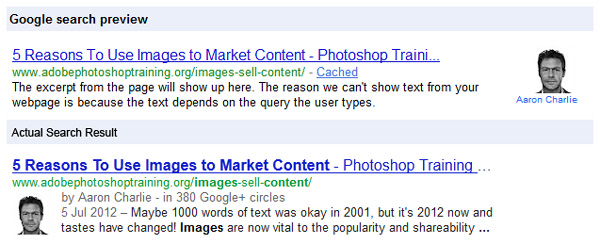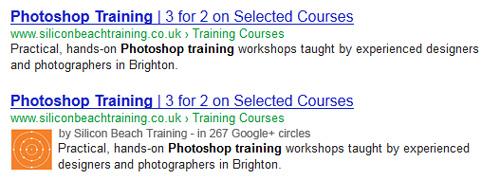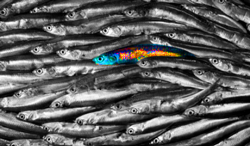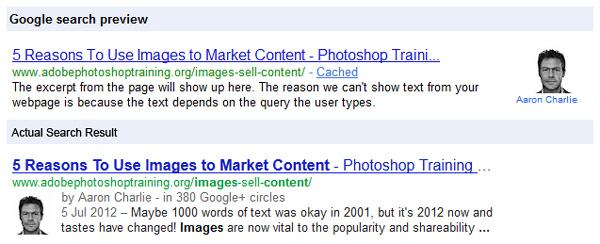Aaron Charlie
31 Jul 2012
Is Google About to Start Showing rel=publisher in SERPs?
UPDATE JULY 2014: Google has now withdrawn authorship photos from SERPs. With this in mind it is unlikely that publisher info will start showing. We still recommend implementing authorship & publisher markup as results will still have a byline and your content will rank better for your Google+ connections.
Recently, while testing out some new titles and markup for our Photoshop courses using Google's Rich Snippet Testing Tool, I was surprised to notice a new addition to the preview:

This will be a familiar sight to those who have marked up their blogs with rel=author already, which we highly recommend. Author info in SERPs is highly visible and many sites (big and small) are seeing a marked increase in click through since implementing author markup. Pages with author markup look similar in the testing tool but usually show the author info on the left of the result in SERPs:

As yet, I haven't found any example of Publisher information appearing in SERPs but if Google is showing it in Rich Snippets previews it can only be a matter of time before they go live.
This could be a huge move for Google. The use of authorship markup in SERPs was a much welcomed move, despite some grumbling about the need to use Google+ to implement it. It gives value to real content written by real people and in theory promotes the best stuff on the web. Okay, it also pushes Google+ in people's faces but that's another story.
Showing Publisher info is a whole different matter. If the inclusion of publisher info in SERPs has as big an effect on clicks as it does for author info then a site ranking 4th with publisher info could out perform a site ranking 1st without. Here's how our Photoshop course could appear in real results, which do you think stands out more?

So what impact could these changes have on search and what should you be doing to precede the changes?
Social Ranking Signals
It's already as good as proven that social signals (sharing, liking, tweeting +1'ing) have both a direct (sites that you have +1'd appear higher in your personal results) and an indirect (strong social signals help with ranking) effect on search.

You should already link from your site to all your social profiles and vice versa, that's a given. But Google seems to think that anybody could do this, so they use rel=publisher to provide a much stronger and more authentic link between your site and your Google+ business page. Use Google's own rel=publisher guide to find out how to do this.
With or without showing the publisher info in SERPs, once you implement rel=author you are telling Google how popular you are on Google+. It won't be much, but it is likely that this does have an impact on where you rank. Not just how many circles you are in but also who has you in circles and how engaged you are with your audience.
If you haven't already then you need to set up your business profile on Google+ and link it to your site. You then need to do everything that you would do with Twitter and Facebook to increase your fans and increase your reach. Try our social media marketing guide for more tips or come down to Brighton for an intense 2-day social media marketing workshop that includes how to use Google+. Don't just build your fans but also engage with them, that's what's important. Make sure your existing customers and site visitors clearly know where to find you on Google+. Despite Google's claims of 90 million profiles, the average Joe isn't active on G+ yet, but you should be prepared for when they are.
Clicks from Search
Numerous heatmap studies show that we are drawn to images on a page before text, so any search results that display a picture are going to have a big advantage over their text-based competitors. Yes, that tiny little icon next to your site should actually increase clicks even if you don't rank 1st.
So even if rel=publisher doesn't have an immediate effect on where you rank, you could still pick up more traffic, which in turn would help your ranking. If you rank 3rd for a query but everyone is clicking on you rather than 1 and 2, then Google are going to think that your site is what they want!
What If Everyone Uses Rel=Publisher?
It is unlikely this will happen for a long time, but if every site on page 1 had rel=publisher implemented there are still some things you can do to make sure searchers eyes are drawn to your result.

Firstly, use an eye grabbing image. Really, this should be your brand logo which should be eye-catching anyway! Make sure your 40x40 px box stands out from the other 9 on the page.
Secondly, build up your followers on Google+ as this could be the first time that the average user will see any measure of popularity in search results. They are more likely to go for the product with over 1 million fans than the one with 5 - fans are endorsements.
As with Facebook, targeted topic pages are more likely to grab followers than branded pages - for example our dedicated Photoshop Training page has 5 times more fans than our main company page - but you can still build your fanbase on Google+ by including clear links to your page on your website and posting great content that your fans share.
When Will Rel=Publisher Happen?
I can't predict exactly when (or even if!) Google will start showing publisher info in SERPs but we will be on the lookout at Silicon Beach. If you do see it happening then please let us know in the comments below or send us a Tweet.

